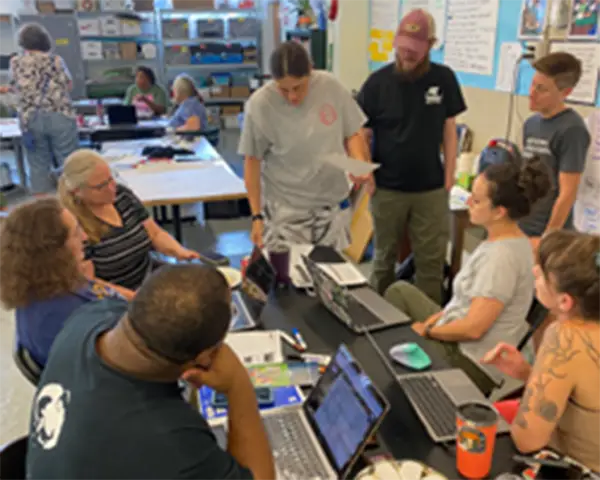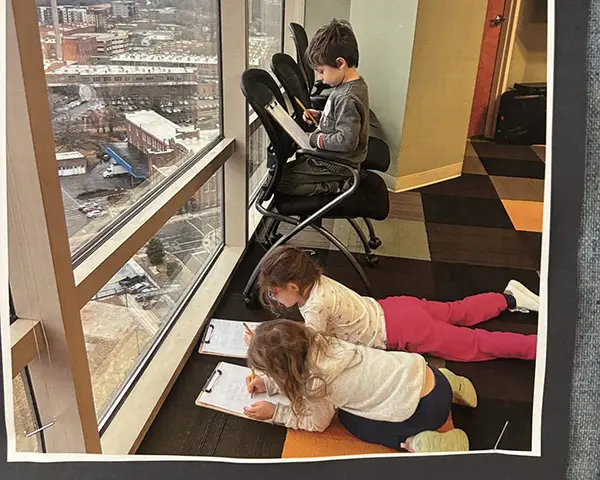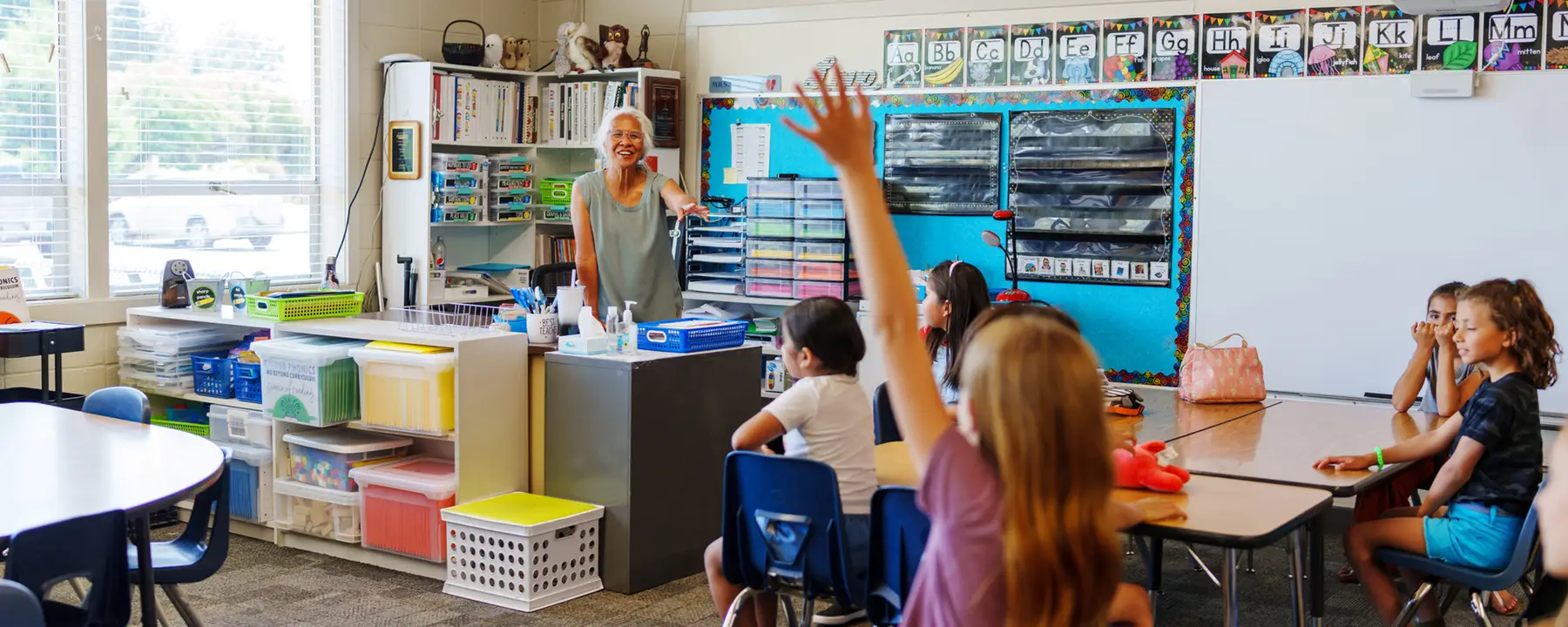Objective
To help Central Park School for Children (CPSC) reignite authentic project-based learning (PBL) post-COVID-19.
Approach
RTI International supported CPSC with collaborative workshops, embedded coaching, and coherent systems design to build its PBL capacity.
Impact
CPSC now has a vision for rigorous, standards-aligned PBL that meets the unique needs of its students.
Commitment to a Post-COVID Project-Based Learning Comeback
In the wake of COVID-19, Central Park School for Children (CPSC) faced a growing disconnect from the rich, student-centered learning that had once defined its classrooms. Located in downtown Durham, North Carolina, CPSC is a charter school known for its deep commitment to Project-Based Learning (PBL)—an approach that fosters curiosity, community connection, and individualized learning from kindergarten through eighth grade. The changes in education post-pandemic and new staff unfamiliar with PBL weakened instructional coherence and disrupted the school’s core mission. To regain alignment and re-energize its PBL practices, CPSC partnered with RTI International’s Center for Education Services for schoolwide regrounding in authentic PBL. Through collaborative workshops, embedded coaching, and coherent systems design, CPSC began to shift from misaligned instruction to unified, inquiry-driven learning rooted in student voice and standards-based rigor.
Partnering with RTI International to Build PBL Capacity
Founded in 2003, CPSC was one of the first PBL public schools in North Carolina and the first “diverse-by-design” public charter school in the Southern United States.
CPSC chose student-centered, standards-based PBL as its instructional model because of its core belief that developmentally appropriate, integrated, hands-on learning brings together all aspects of a multifaceted curriculum. Prior to COVID, K-4 projects were deeply rooted in the school and local community, whereas middle school projects were integrated across content areas and addressed ideas on a historical, national, or global level.
In the aftermath of the pandemic, CPSC sought to reground itself in the principles of authentic project-based learning work and turned to RTI as a strategic partner in that effort. For 2 years, RTI provided comprehensive support tailored to the school's evolving needs to develop a unified understanding and collaborative practice around PBL.

Fourth grade team collaborating with the Exceptional Children (EC) Department at CPSC while developing their PBL project ideas.
Year 1: Tailored Support for PBL Implementation
In Year 1, RTI provided differentiated, high-quality professional learning tailored to the continuum of teacher experience, from those new to PBL to seasoned implementers. Support included embedded coaching for CPSC’s in-house PBL coach and consultation with school leadership to strengthen change management and implementation strategies.
Year 2: Advancing Schoolwide PBL with Targeted Coaching
In Year 2, RTI launched a schoolwide training program based on its Framework for Integrated Project Design and Implementation. This was followed by small-group and one-on-one coaching to deepen teacher practice and continue supporting leadership and instructional coherence. Through this responsive, multi-tiered approach, RTI helped CPSC reestablish a shared vision for rigorous, standards-aligned PBL that meets the diverse needs of its learners and fosters meaningful, student-centered learning experiences.
"Thanks to the workshops with RTI, our staff began to develop a shared understanding of true project work. With support from my RTI coach, I identified key areas where teachers need help and developed expectations, checklists, and differentiated training modules. We began moving away from coloring sheets and pre-packaged thematic units toward projects centered on students' lives, questions, and deep curriculum integration." – Lucia Marcus, Central Parks
Systems for Sustainable PBL Practice
Today, CPSC is celebrating a return to student-centered learning experiences that ignite curiosity and rebuild a cohesive school culture that aligns with its founding mission. This was exemplified in the kindergarten class’s project “Our Durham Community,” where students launched their investigation with a trip to the top of the Durham Centre. From this high vantage point, they sketched the city skyline and bought their observations back to the classroom. Their inquiry continued through walking fieldwork; interviews with community experts like firefighters and architects; and immersive experiences that integrated reading, writing, and art. The culminating event was a vibrant demonstration of integrated standards-based learning rooted in student voice, choice, and collaboration.

Kindergarten students at CPSC doing observational drawings from the top of the Durham Centre for their "Our Durham Community" PBL project.
This renewed commitment to authentic project-based learning work has extended beyond individual classrooms to shape a stronger professional learning culture across the school. With RTI’s support, CPSC implemented systems to ensure consistent, high-quality project design and implementation aligned to academic standards and student interest.
"The positive shift came from close attention to project design, intentional modeling in classrooms, and nurturing teachers' ability to connect with student creativity and enthusiasm. One of the most powerful tools I learned was the tuning protocol, which I implemented to foster structured peer reflection and post-project conferencing. We also encouraged teachers to document all phases of project work from anchor charts to student-created artifacts and captions so the story of learning could be seen, shared, and celebrated across our school community." – Lucia Marcus, Central Parks PBL Coach
In the 2024-2025 school year, the school reintroduced a PBL Innovation Grant empowering teachers to pilot new ideas and share best practices. It also relaunched The Project Path, a schoolwide documentation tool that supports project reflection and cross-team learning. By embedding time for post-project reflection, peer feedback, and dedicated collaboration time into the school calendar, CPSC is building a culture of shared learning, accountability, and continuous improvement. Through these efforts, the school has not only restored the integrity of its PBL model, it has deepened its identity as a charter school committed to hands-on, community-connected, and student-driven learning.


